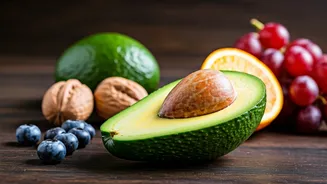The Heart-Healthy Diet
Embarking on a heart-healthy journey starts with understanding the power of a balanced diet. Plant-based foods are packed with essential nutrients, fiber,
and antioxidants, making them crucial for maintaining cardiovascular health. Incorporating these foods into your diet can help reduce the risk of heart disease, lower cholesterol levels, and improve blood flow. Remember, the goal is not just to eat; it's to nourish your body with foods that support your heart's well-being. A consistent, mindful approach to eating is the foundation for lasting heart health. Let's explore some specific foods that can help you achieve this important objective. The benefits of a plant-focused diet extend beyond heart health, often contributing to increased energy levels and overall vitality. So, let’s start this journey toward a healthier heart, one delicious, plant-based meal at a time!
Leafy Green Vegetables
Leafy green vegetables are nutritional powerhouses, particularly for heart health. Spinach, kale, and other leafy greens are rich in vitamins, minerals, and antioxidants, including vitamin K, which is essential for blood clotting and healthy arteries. These vegetables also contain nitrates, which the body converts into nitric oxide. Nitric oxide helps to dilate blood vessels, improving blood flow and reducing blood pressure. Including these in your diet regularly, whether in salads, smoothies, or cooked dishes, can provide substantial benefits for your heart. Make an effort to add at least one serving of leafy greens to your meals daily, for optimal health benefits. You can also explore different ways of cooking these vegetables such as steaming, sautéing, or adding them to soups to enhance their taste and make them easier to consume. Their versatility allows you to enjoy them in various forms, making it easier to integrate them into your lifestyle.
Berries: Nature's Candy
Berries like blueberries, strawberries, and raspberries are loaded with antioxidants and phytonutrients. These compounds help protect the body against cell damage and inflammation, which are significant contributors to heart disease. The vibrant colors of berries indicate a high concentration of beneficial antioxidants, such as anthocyanins. Anthocyanins not only give berries their color but also help improve blood vessel function and reduce the risk of plaque buildup in the arteries. Regular consumption of berries has been linked to lower blood pressure, improved cholesterol levels, and enhanced overall cardiovascular health. Whether you enjoy them fresh, frozen, or in smoothies, berries offer a delicious and health-promoting way to support your heart. Incorporate a handful of berries into your daily diet by adding them to your breakfast cereal, yogurt, or as a snack throughout the day. The delightful taste and health benefits make berries an ideal choice for anyone looking to boost their heart health.
Whole Grains Benefits
Whole grains, such as oats, brown rice, and quinoa, are excellent sources of fiber, which plays a crucial role in maintaining heart health. Fiber helps lower cholesterol levels, preventing the buildup of plaque in arteries. Moreover, whole grains provide essential vitamins and minerals, promoting overall cardiovascular function. Unlike refined grains, whole grains retain their bran and germ, which are packed with nutrients. Including whole grains in your diet can reduce your risk of heart disease, stroke, and type 2 diabetes. Start by substituting refined grains with whole grain alternatives, and you’ll start seeing changes. Start your day with a bowl of oatmeal, swap white rice for brown rice, and incorporate quinoa into your salads and side dishes. Whole grains also provide sustained energy, keeping you feeling full for longer and reducing the urge to snack on unhealthy foods. The dietary fiber in whole grains also supports a healthy digestive system, which contributes to overall well-being and aids in maintaining a healthy weight.
Nuts and Seeds
Nuts and seeds, such as almonds, walnuts, flaxseeds, and chia seeds, are rich in healthy fats, fiber, and various nutrients. These foods provide omega-3 fatty acids, which can help reduce inflammation and lower the risk of heart disease. Healthy fats found in nuts and seeds help to lower harmful LDL cholesterol levels while increasing beneficial HDL cholesterol. Fiber helps to regulate blood sugar levels and maintain healthy arteries. Nuts and seeds are also an excellent source of protein, which contributes to feeling full and satisfied. Incorporating a handful of nuts or seeds into your daily diet as a snack or adding them to your meals can be a great way to boost your heart health. Experiment with different nuts and seeds to find your favorites, and enjoy them as part of a balanced diet. Remember to consume nuts and seeds in moderation due to their calorie content, but their numerous health benefits make them a valuable addition to any heart-healthy eating plan. Try adding them to salads, smoothies, or oatmeal for added nutrition.













